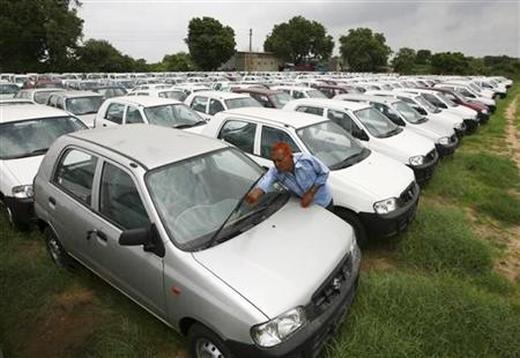Photographs: Courtesy, Maruti Suzuki
The issue goes beyond Maruti. Several well-known companies have sharply increased royalty payments after the government gave them a free hand, says T N Ninan.
The question in Maruti's relationship with its parent company, Suzuki, is whether the Japanese company intends to treat its minority Indian shareholders fairly.
There is no corporate barrier to unfair treatment because Suzuki has majority ownership of Maruti, the "independent" directors seem inclined to sign on the dotted line, and the company is essentially managed by Japanese executives seconded by Suzuki.
When Indian shareholders get agitated - as some mutual funds have been these past few weeks - they can knock at many doors, but the operational freedom given to companies is such that it is unclear whether any ministry or regulator will or can intervene.
…
Is there hope for Maruti's protesting shareholders?
Image: A worker adjusts the windscreen wipers of a parked Alto car at a Maruti Suzuki stockyard.Photographs: Amit Dave/Reuters
The issue rests essentially with what Suzuki intends to do. And its past record does not offer Maruti's protesting shareholders much hope.
Consider the royalty question. Suzuki charges 5.7 per cent of Maruti sales as royalties (nearly double the level that prevailed before the government abolished caps on such payments in 2009).
This is an astonishing 40 per cent of pre-royalty profits, and the company is far and away the top remitter of such royalty payments.
...
Is there hope for Maruti's protesting shareholders?
Photographs: Courtesy, Maruti Suzuki
What makes the payment particularly egregious is that cars are not like pharmaceuticals - between a half and two-thirds of the final product value comprises bought-out items like tyres, ball bearings, wheels, batteries, seats, headlights and gear assemblies.
To claim royalty payments on their value, to which Suzuki has contributed nothing by way of technology, is rich. The royalty outgo, if calculated on the car value that is not bought-out, works out to 15 per cent or more.
This is extortionate; the company's defence, that Maruti nevertheless offers good profits, is not an answer. Ambit Capital, which has looked at international companies in India, ranks Maruti as the worst for how it treats its Indian shareholders.
...
Is there hope for Maruti's protesting shareholders?
Photographs: Courtesy, Maruti Suzuki
Against this backdrop, and past attempts by Suzuki to set up an unlisted subsidiary in India, the mutual funds are right to be suspicious of what is coming along with a new wholly-owned Suzuki subsidiary that will make cars in Gujarat, instead of Maruti doing so as was originally proposed.
Questions of transfer pricing between a listed and an unlisted subsidiary are marked by an obvious conflict of interest. The company has been busy trying to explain things, but these run into the Suzuki record of past conduct; as always, actions speak louder than words.
The issue goes beyond Maruti. Several well-known companies have sharply increased royalty payments after the government gave them a free hand.
...
Is there hope for Maruti's protesting shareholders?
Photographs: Courtesy, Suzuki Motor Corporation
The new companies law, passed by Parliament last year, gives significant protection to minority shareholders by stipulating that interested shareholders cannot vote on related party transactions; also, independent directors are given a greater role.
For some reason, however, the government has been slow in notifying the bulk of the provisions in the new law; Maruti and others are rushing through with changes in order to beat the implementation of the law.
Indeed, last year there were reports that the industry ministry was considering re-imposing a cap on royalty payments, and that a proposal to this effect was on the minister's desk, but nothing happened.
...
Is there hope for Maruti's protesting shareholders?
Image: Shinzo Nakanishi, chief executive and MD of Maruti Suzuki poses with company's new compact SUV XA Alpha car.Photographs: Adnan Abidi/Reuters
The finance minister did act, by raising the tax payable on such outgo from 10 per cent to 25 per cent, but this makes little difference to most companies as they are protected under double-taxation agreements.
The contemporary experience makes it clear once again that most international companies continue to owe primary loyalty to their home markets; their conduct in other markets is constrained only by the requirements of domestic law - and often not even by that because of the rampant practice of transfer pricing, on which the tax authorities have belatedly clamped down.
It is time to clamp down on royalty payments too.








article